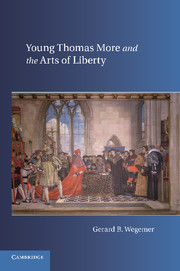Book contents
- Frontmatter
- Contents
- List of Illustrations
- Acknowledgments
- List of Abbreviations
- 1 Young Thomas More
- 2 Fashioning Peace and Prosperity
- 3 Cicero's and More's First Citizens
- 4 More's Earliest Views of Humanitas, Libertas, and Respublica, 1500–1506
- 5 More's Life of Pico della Mirandola (c. 1504–1507)
- 6 More's 1509 Coronation Ode
- 7 Political Poems of 1509–1516
- 8 Richard III
- 9 Utopia
- 10 The Un-Utopian Thomas More Family Portrait
- 11 The Arts of Liberty
- Works Cited
- Index
7 - Political Poems of 1509–1516
Proposing Self-Government by “Sound Deliberation”
Published online by Cambridge University Press: 25 October 2011
- Frontmatter
- Contents
- List of Illustrations
- Acknowledgments
- List of Abbreviations
- 1 Young Thomas More
- 2 Fashioning Peace and Prosperity
- 3 Cicero's and More's First Citizens
- 4 More's Earliest Views of Humanitas, Libertas, and Respublica, 1500–1506
- 5 More's Life of Pico della Mirandola (c. 1504–1507)
- 6 More's 1509 Coronation Ode
- 7 Political Poems of 1509–1516
- 8 Richard III
- 9 Utopia
- 10 The Un-Utopian Thomas More Family Portrait
- 11 The Arts of Liberty
- Works Cited
- Index
Summary
What Is the Best Form of the Respublica?
A senator is elected by the people to rule; a king attains this end by being born. In the one case blind chance rules; in the other, sound deliberation.
Thomas More, Epigram 198/1, 12–13The Good “First Citizen” Is a Father Not a Master
The godly first citizen [pius princeps] will never lack children/freemen. He is father to the whole realm. Therefore the most successful first citizen abounds with as many freemen as citizens.
Thomas More, Epigram 111In every human being, “reason ought to reign like a king,” and in every respublica, “sound deliberation” is the best way to rule. But every human being is free and can “tak[e] counsel [consilium] of … desire” and thus freely “take from desire” a “plan … reckless and shameless,” so reckless, so shameless that fratricide and generations of civil war have occurred since the beginning of recorded history.
For reason to reign, art must help, or so Lucian shows through his skillful use of humor. More does the same in his collection of 260 epigrams. Though intended to be published with the first edition of Utopia, the epigrams were actually published only with the second, thus providing another level of dialectical engagement for the attentive reader of More's puzzling masterpiece.
The 260 epigrams display the wide and humorous and all-too-familiar range of human irrationality. Many are comic sketches translated from the Greek Anthology, and More's original poems are often reminiscent of Terence, the Roman comedian he loved.
- Type
- Chapter
- Information
- Young Thomas More and the Arts of Liberty , pp. 104 - 118Publisher: Cambridge University PressPrint publication year: 2011



